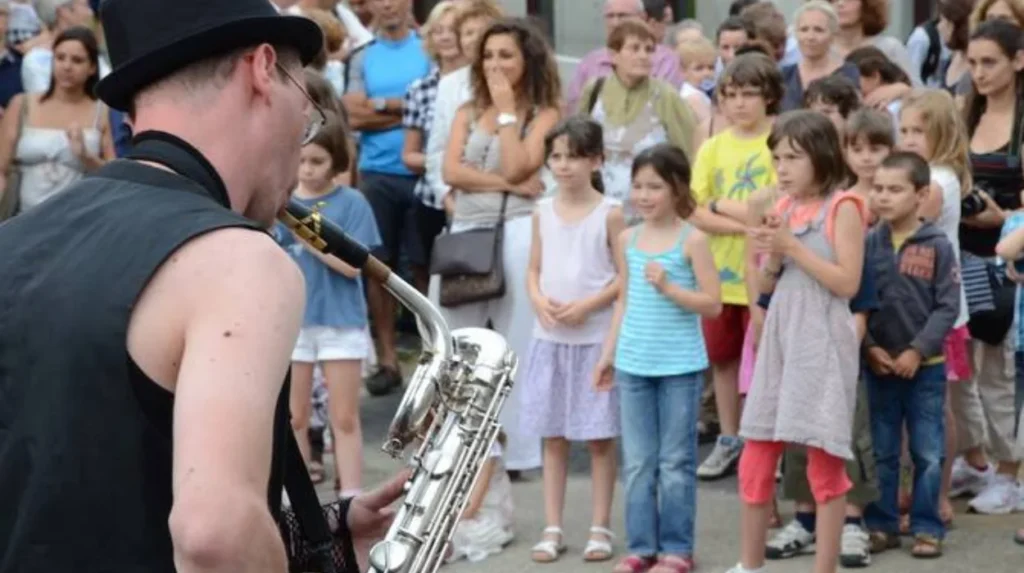Saudi Arabia’s recent hosting of the Franco-Saudi Music Week in Jeddah may be heralded by some as a milestone in cultural openness and international cooperation, but it cannot — and should not — discount the larger and more grave questions of the Kingdom’s fitness to host mega-international events like the FIFA World Cup.
We all should be extremely concerned by the manner in which cultural events like these are used to whitewash a country’s history of human rights abuses and authoritarianism in the name of cultural diplomacy. While Music Week in Jeddah — supported by the French Embassy, Alliance Française, and other Saudi establishments — has actually brought together creative minds beyond borders, it also comes under a much greater trend of “sportswashing” and now, “culture-washing.”
The Power of Culture — and Its Exploitation
Music Week in Jeddah, 21-27 June, involved different performances and jam sessions of French and Saudi artists, including a performance by French-Moroccan artist Karimouche with Saudi oud player Roaa Lam. Such artistic exchanges promote cross-cultural understanding, especially if they have commonalities like women’s emancipation, preservation of heritage, and transnational solidarity. All such events are necessary in the promotion of any forward-looking society.
But here’s the catch. Saudi Arabia also continues to have a very tight hold on freedom of speech, suppresses dissent, and restricts civil liberties. Even as artists like Karimouche celebrate the voices and empowerment of women, it must be remembered that women’s rights activists like Loujain al-Hathloul were arrested in 2018 and reportedly tortured for campaigning for such freedoms a couple of years ago.
The Illusion of Reform
Yes, cultural events can be beautiful, healing, and inspiring. They can challenge norms and initiate change. But when they are endorsed by authoritarian regimes with entrenched policies of repression, they are more likely to have an ulterior motive — to reinvent an international reputation marred by abuse and divert attention away from structural injustices.
Saudi Arabia Crown Prince Mohammed bin Salman has launched Vision 2030, the Kingdom’s national drive for modernization. That is not just Franco-Saudi music festivals but also big-ticket sporting events — Formula One, LIV Golf, and potentially a 2034 FIFA World Cup. These are not just about sport or culture — they are PR moves designed to get the most out of an image overhaul.
The same nation that takes in international artists and DJs also censors, monitors dissidents, and criminalizes peaceful demonstration. The state tightly controls public-visible events while curtailing independent civil society and muzzling critical voices behind the scenes.
Why FIFA Should Not Turn a Blind Eye
Because it is the international governing body of football, FIFA should not lend legitimacy to a regime which consistently abuses human rights. Granting Saudi Arabia the right to host the World Cup would not only go against FIFA’s own stated principles but risk making the tournament into a circus of hypocrisy.
The Qatar 2022 World Cup was already mired in scandal over human rights abuses against workers and curbs on freedom. Handing over to Saudi Arabia — where political dissent is illegal and beheadings are their bleakly routine standard — would be a more disturbing precedent.
Even as events like the Franco-Saudi Music Week rejoice in an image of diversity and cooperation, we must ask ourselves: Is culture being used here to empower human beings — or to cover up repression?
The Double Standard
How richly ironic that Western democracies like France continue their cultural diplomacy with the dictatorial regimes without concern for the contradictions. French officials welcomed the festival as a sign of growing friendship, but failed to mention the elephant in the room: repression of basic human freedoms in Saudi Arabia remains uninterrupted.
This vacuum enables authoritarian regimes to claim international legitimacy. The more and more global institutions — cultural and sporting in nature — choose cooperation over condemnation, the more Saudi Arabia gains a cover of normality and progress it does not deserve.
Standing Against FIFA’s Decision: A Call to Action
We must fight the normalisation of authoritarian domination by sport and by culture. Cultural collaboration, if genuine and founded upon respect and freedom for both sides, is powerful. As a means of state propaganda, however, it has no significance.
The FIFA World Cup is not a competition; it’s a festival of global human solidarity, strength, and spirit. A country with a deplorable human rights record — where freedom of speech is an act that can be criminalized and women are not yet equal to men in many respects — should not be able to host such an event that has the ability to unite.
The world, athletes, artists, and civil society should look beyond the performances, spotlights, and scripted smiles and look at the realities of the living conditions in which the majority of people in Saudi Arabia continue to reside.
Culture Can Bridge — But Must Also Challenge
Events like the Franco-Saudi Music Week can be made to serve as a platform for dialogue, but only if accompanied by actual structural change and openness. Music should never be exploited as a ruse to hide injustice. Culture may unite us — but it too has to speak truth to power.
Until Saudi Arabia demonstrates a real commitment to human rights — not just through festivals and sponsorships, but institutional change — it shouldn’t be accorded the privilege of hosting the world’s most popular sporting spectacle.

